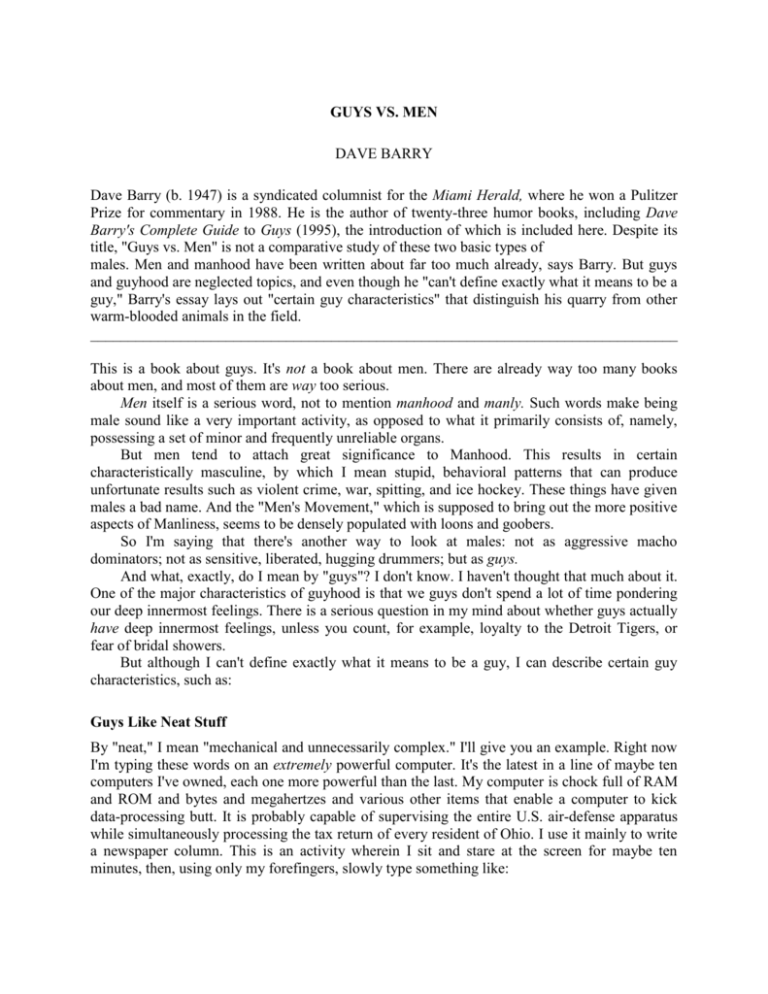Guys vs. Men - Poway Unified School District
advertisement

GUYS VS. MEN DAVE BARRY Dave Barry (b. 1947) is a syndicated columnist for the Miami Herald, where he won a Pulitzer Prize for commentary in 1988. He is the author of twenty-three humor books, including Dave Barry's Complete Guide to Guys (1995), the introduction of which is included here. Despite its title, "Guys vs. Men" is not a comparative study of these two basic types of males. Men and manhood have been written about far too much already, says Barry. But guys and guyhood are neglected topics, and even though he "can't define exactly what it means to be a guy," Barry's essay lays out "certain guy characteristics" that distinguish his quarry from other warm-blooded animals in the field. ______________________________________________________________________________ This is a book about guys. It's not a book about men. There are already way too many books about men, and most of them are way too serious. Men itself is a serious word, not to mention manhood and manly. Such words make being male sound like a very important activity, as opposed to what it primarily consists of, namely, possessing a set of minor and frequently unreliable organs. But men tend to attach great significance to Manhood. This results in certain characteristically masculine, by which I mean stupid, behavioral patterns that can produce unfortunate results such as violent crime, war, spitting, and ice hockey. These things have given males a bad name. And the "Men's Movement," which is supposed to bring out the more positive aspects of Manliness, seems to be densely populated with loons and goobers. So I'm saying that there's another way to look at males: not as aggressive macho dominators; not as sensitive, liberated, hugging drummers; but as guys. And what, exactly, do I mean by "guys"? I don't know. I haven't thought that much about it. One of the major characteristics of guyhood is that we guys don't spend a lot of time pondering our deep innermost feelings. There is a serious question in my mind about whether guys actually have deep innermost feelings, unless you count, for example, loyalty to the Detroit Tigers, or fear of bridal showers. But although I can't define exactly what it means to be a guy, I can describe certain guy characteristics, such as: Guys Like Neat Stuff By "neat," I mean "mechanical and unnecessarily complex." I'll give you an example. Right now I'm typing these words on an extremely powerful computer. It's the latest in a line of maybe ten computers I've owned, each one more powerful than the last. My computer is chock full of RAM and ROM and bytes and megahertzes and various other items that enable a computer to kick data-processing butt. It is probably capable of supervising the entire U.S. air-defense apparatus while simultaneously processing the tax return of every resident of Ohio. I use it mainly to write a newspaper column. This is an activity wherein I sit and stare at the screen for maybe ten minutes, then, using only my forefingers, slowly type something like: Henry Kissinger looks like a big wart. I stare at this for another ten minutes, have an inspiration, then amplify the original thought as follows: Henry Kissinger looks like a big fat wart. Then I stare at that for another ten minutes pondering whether I should try to work in the concept of "hairy." This is absurdly simple work for my computer. It sits there, humming impatiently, bored to death, passing the time between keystrokes via brain-teaser activities such as developing a Unified Field Theory of the universe and translating the complete works of Shakespeare into rap. In other words, this computer is absurdly overqualified to work for me, and yet soon, I guarantee, I will buy an even more powerful one. I won't be able to stop myself, I'm a guy. Probably the ultimate example of the fundamental guy drive to have neat stuff is the Space Shuttle. Granted, the guys in charge of this program claim it has a Higher Scientific Purpose, namely to see how humans function in space. But of course we have known for years how humans function in space: They float around and say things like: "Looks real good, Houston!" No, the real reason for the existence of the Space Shuttle is that it is one humongous and spectacularly gizmo-intensive item of hardware. Guys can tinker with it practically forever, and occasionally even get it to work, and use it to place other complex mechanical items into orbit, where they almost immediately break, which provides a great excuse to send the Space Shuttle up again. It's Guy Heaven. Other results of the guy need to have stuff are Star Wars, the recreational boating industry, monorails, nuclear weapons, and wristwatches that indicate the phase of the moon. I am not saying that women haven't been involved in the development or use of this stuff. I'm saying that, without guys, this stuff probably would not exist; just as, without women, virtually every piece of furniture in the world would still be in its original position. Guys do not have a basic need to rearrange furniture. Whereas a woman who could cheerfully use the same computer for fiftythree years will rearrange her furniture on almost a weekly basis, sometimes in the dead of night. She'll be sound asleep in bed, and suddenly, at 2 A.M., she'll be awakened by the urgent thought: The blue-green sofa needs to go perpendicular to the wall instead of parallel, and it needs to go there RIGHT NOW. SO she'll get up and move it, which of course necessitates moving other furniture, and soon she has rearranged her entire living room, shifting great big heavy pieces that ordinarily would require several burly men to lift, because there are few forces in Nature more powerful than a woman who needs to rearrange furniture. Every so often a guy will wake up to discover that, because of his wife's overnight efforts, he now lives in an entirely different house. (I realize that I'm making gender-based generalizations here, but my feeling is that if God did not want us to make gender-based generalizations, She would not have given us genders.) Guys Like a Really Pointless Challenge Not long ago I was sitting in my office at the Miami Herald's Sunday magazine, Tropic, reading my fan mail when I heard several of my guy coworkers in the hallway talking about how fast they could run the forty-yard dash. These are guys in their thirties and forties who work in journalism, where the most demanding physical requirement is the ability to digest vending-machine food. In other words, these guys have absolutely no need to run the forty-yard dash. But one of them, Mike Wilson, was writing a story about a star high-school football player who could run it in 4.38 seconds. Now if Mike had written a story about, say, a star high-school poet, none of my guy coworkers would have suddenly decided to find out how well they could write sonnets. But when Mike turned in his story, they became deeply concerned about how fast they could run the forty-yard dash. They were so concerned that the magazine editor, Tom Shroder, decided that they should get a stopwatch and go out to a nearby park and find out. Which they did, a bunch of guys taking off their shoes and running around barefoot in a public park on company time. This is what I heard them talking about, out in the hall. I heard Tom, who was thirty-eight years old, saying that his time in the forty had been 5.75 seconds. And I thought to myself: This is ridiculous. These are middle-aged guys, supposedly adults, and they're out there bragging about their performance in this stupid juvenile footrace. Finally I couldn't stand it anymore. Hey!" I shouted. "I could beat 5.75 seconds." So we went out to the park and measured off forty yards, and the guys told me that I had three chances to make my best time. On the first try my time was 5.78 seconds, just three-hundredths of a second slower than Tom's, even though, at forty-five, I was seven years older than he. So I just knew I'd beat him on the second attempt if I ran really, really hard, which I did for a solid ten yards, at which point my left hamstring muscle, which had not yet shifted into Spring Mode from Mail-Reading Mode, went, and I quote, "pop." I had to be helped off the field. I was in considerable pain, and I was obviously not going to be able to walk right for weeks. The other guys were very sympathetic, especially Tom, who took the time to call me at home, where I was sitting with an ice pack on my leg and twentythree Advil in my bloodstream, so he could express his concern. "Just remember," he said, "you didn't beat my time.” There are countless other examples of guys rising to meet pointless challenges. Virtually all sports fall into this category, as well as a large part of U.S. foreign policy ("I'll bet you can't capture Manuel Noriega!" "Oh YEAH??") Guys Do Not Have a Rigid and Well-Defined Moral Code This is not the same as saying that guys are bad. Guys are capable of doing bad things, but this generally happens when they try to be Men and start becoming manly and aggressive and stupid. When they're being just plain guys, they aren't so much actively evil as they are lost. Because guys have never really grasped the Basic Human Moral Code, which I believe, was invented by women millions of years ago when all the guys were out engaging in some other activity, such as seeing who could burp the loudest. When they came back, there were certain rules that they were expected to follow unless they wanted to get into Big Trouble, and they have been trying to follow these rules ever since, with extremely irregular results. Because guys have never internalized these rules. Guys are similar to my small auxiliary backup dog, Zippy, a guy dog4 who has been told numerous times that he is not supposed to (1) get into the kitchen garbage or (2) poop on the floor. He knows that these are the rules, but he has never really understood why, and sometimes he gets to thinking: Sure, I am ordinarily not supposed to get into the garbage, but obviously this rule is not meant to apply when there are certain extenuating5 circumstances, such as (1) somebody just threw away some perfectly good seven-weekold Kung Pao Chicken, and (2) I am home alone. And so when the humans come home, the kitchen floor has been transformed into GarbageFest USA, and Zippy, who usually comes rushing up, is off in a corner disguised in a wig and sunglasses, hoping to get into the Federal Bad Dog Relocation Program before the humans discover the scene of the crime. When I yell at him, he frequently becomes so upset that he poops on the floor. Morally, most guys are just like Zippy, only taller and usually less hairy. Guys are aware of the rules of moral behavior, but they have trouble keeping these rules in the forefronts of their minds at certain times, especially the present. This is especially true in the area of faithfulness to one's mate. I realize, of course, that there are countless examples of guys being faithful to their mates until they die, usually as a result of being eaten by their mates immediately following copulation. Guys outside of the spider community, however, do not have a terrific record of faithfulness. I'm not saying guys are scum. I'm saying that many guys who consider themselves to be committed to their marriages will stray if they are confronted with overwhelming temptation, defined as "virtually any temptation.” Okay, so maybe I am saying guys are scum. But they're not mean-spirited scum. And few of them—even when they are out of town on business trips, far from their wives, and have a clear-cut opportunity—will poop on the floor. Barry, Dave. “Guys vs. Men.” The Norton Sampler, Sixth Edition. Ed. Thomas Cooley. New York: W. W. Norton and Company, 2003. 246-251.





